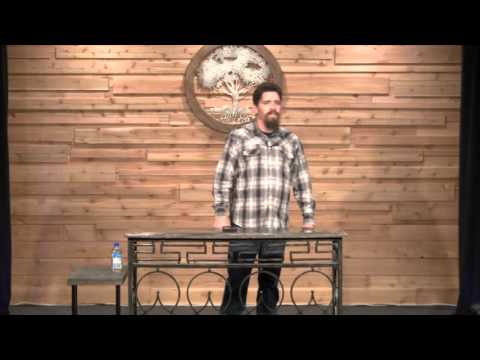OH ON CHRISTMAS EVE
At the new year’s service, they had a time of sharing testimonies, and they said they were “bragging on God.” They wanted to share even after the countdown to the new year. Even afterwards, Ray couldn’t sleep, there was that glow of thanksgiving.
Romans 10:1-4,10-15
We’re beginning with a three part series entitled “Everything Culminates in Jesus.” First, everything in the law points to Jesus. Second, salvation comes through Jesus. Third, Jesus is the head of the church. We’ll read through Romans 10-12.
Up to this point, Romans might seem like a theological textbook rather than a person letter written by Paul to local churches. He had people and leaders in mind. In writing Romans, he was writing to the Christian Jews as well as the Gentile Christian majority. He said to them that they were free in Christ.
We might wonder why they don’t get along, but we have to remember the background of the Jewish exclusivity. It was like mixing oil and vinegar to put Jews and non-Jews together. Romans 10 talks to the Jews, and Romans 11 to the Gentiles, and in Romans 12 he brings the two together to form one body, the church.
Through the gospel, it is possible for people who can’t stand each other become brothers and sisters in Christ. The gospel breaks down generational, socioeconomic and racial barriers.
Romans 10:14 again: We tend to focus on the calling to preach to the Gentiles – how can they hear if no one teaches them? Ray recited these verses on a missions trip to Japan. It certainly applies to evangelism, but let’s get the entire context.
The primary focus of these passages is the nation of Israel. It applies to those who have already heard the message, to us. The text is asking: Do we really call on God? We’ll see two ways Israel rejected God. If Israel rejected God, how do we know that we aren’t? The answer is that if Jesus is the focus, we’re on target, but if Jesus falls out of the culmination of everything, we’re rejecting God.
God could have chosen to appear in a number of ways. He could have appeared to everyone in a dream, or to broadcast a message on the internet. Instead, he chose to relate to a particular people on earth. He chose to relate to them, and over time there became a common history shared between them.
Knowing God is not about reading his resume. It’s about talking to others who have worked with him and an interview. In picking someone to work, first impressions mean a lot, but can be deceiving. At his first job after college, Ray worked at Bank of America, and one night was staying late and fell asleep before his boss woke him up in the morning. This gave him a favorable impression that let him off the hook a bit.
Even when it comes to dating, each party is trying to give a good first impression. When Ray and Jackie first went on dates, it was all the nice places, but now they go to KFC.
We have to ask God, in relating to Israel, was he just trying to give a good first impression? No, God is perfect and behaved honorably. Somewhere along the line, that relationship was replaced with a religion.
The Jews knew all the rituals and their significance. God had to send prophet after prophet to correct them. There was a 400-year gap after Malachi, where God withdrew. All they had left was a religious system. They lost the essential truth that grace was the only way to be made perfect. In verse 3, we see that they had made up their own righteousness.
So they couldn’t see the way Jesus was a culmination of the OT. There were over 300 prophecies that Jesus fulfilled. But they couldn’t see the new righteousness that Jesus brought.This is common to human nature. We like religion because it’s like therapy, you do things and they make you feel better. Relationships are more difficult, because there are people involved. Marriage, one of the strongest relationships, is a slow learning process as you get used to each other. There is a whole range of emotions. Religion is much easier.
Why else did they miss Jesus? One way to think about it is that by believing in Jesus, they had to lose things. They had to leave the comforts of their routines, what they were used to. We too like our habits and traditions, because we don’t have to think. Whatever our religious destination, we follow the same route every time.
The leaders of the religious community also had their status at stake. We too want status and reputation. Ray grew up in a rough NY neighborhood, and he didn’t play many sports. Then he moved to a more athletic neighborhood, and he was always the last one picked at recess.He remembers one day during kickball when he played right field and a big athlete was up with the bases loaded and the ball was kicked high in the air right to him. Then it hit him in the chest and bounced straight up, and the center fielder collided with him. Fortunately, he fell down on his back and the ball came straight down to him and he caught it. He was now a somebody. Unlike getting A’s on his tests, this gave him social standing.
We want to be popular, and kids will do virtually anything for that kind of social standing. In the Jewish community back then, too, the rabbis and teachers of the law were the rock stars of the community. Back then, aligning yourself with the right rabbi was a ticket to success. Reread the gospels and count the number of times that Jesus bumps heads with these religious leaders and asks them to repent. His message was simple: Abandon your religion and repent. Start over and look to me.
Jesus came to the lost sheep of Israel, and the focus shifts to the Gentiles. As he reads this, Ray was reminded of an essay he wrote in seminary on the question, “Was Jesus sent to save Israel, or the whole world?” He wrote a simplistic essay saying that of course, Jesus was sent to save the whole world. He got a B-, and now he realizes why. Jesus had all Jewish disciples, and stayed in Israel. There are exceptions, of course, like the Canaanite woman. We see from her example that he never specifically excluded them. But still, the predominant audience of Jesus was Israel.
But the larger plan was for Israel to project Jesus to the world, as shown in Isaiah 42:5-7. Starting with Paul, God’s plan does include the whole world. What does this mean? Israel did have a privileged position in God’s world. But they abandoned their privilege by missing Jesus. They couldn’t recognize him for what he was.Paul answers his questions in Romans 10:14 in verse 18: Of course they have heard the word. In the next verse, Paul cites a prophecy from Joel 2, saying that God would make Israel envious. From this verse, we see that God is quite emotional. We might think of him as powerful and above emotion, like Spock on Star Trek. He is using the vocabulary of a spurned lover, saying that he will go to the Gentiles. Relationship has emotion. By Israel’s rejection of Christ, the gospel was given to the Gentiles, as Paul’s divinely-ordained life focus.
In verses 20 and 21, Paul uses more OT quotations. Israel had sought after God through religion, but God gave himself to others.How do we know whether we’re just following a religion? The more relevant question: How do we know if Jesus is the culmination of all that we do? Let’s think back on the past year, corporately and individually. Are there things we need to change in our worship service? Have we noticed Christ among us? Are we acting as a body? When we gather throughout the week, is the name of Christ exalted? Do we encourage each other in our resolve? Have we expressed our need for one another in dealing with our sins? Is anyone there to carry your burdens? When problems hit, was Christ the first person you turned to? What about the joyful moments – did you thank Christ? Do you have brothers and sisters to turn to and thank? Have you grown in the past year?
These are tough questions, but it’s important in order to be able to say that we have followed Christ.



